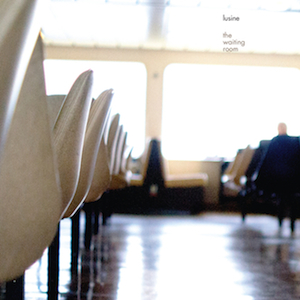Lusine The Waiting Room
Though Jeff McIlwain’s output as Lusine has seen a dynamic evolution across his 14 years […]

Though Jeff McIlwain’s output as Lusine has seen a dynamic evolution across his 14 years of electronic sound design, he seems to have reached a comfort zone. The stark ambient and glitch that dominated his early work has softened in his recent efforts for Ghostly International, particularly on 2009’s A Certain Distance, and the trend has been faithfully continued here on The Waiting Room. It’s not that the more clear-cut IDM qualities which defined the first half of McIlwain’s career have been lost or tuned out—they’ve merely become pieces in a larger puzzle, one that also demonstrates his prowess across melodic techno, deep house, and even the indie-electronic realm.
Picking up right where A Certain Distance left off, the Seattle-based producer’s latest LP shows the same passion for methodical soundscapes, which are no less thoughtful for their glowing warmth. McIlwain’s ability to toggle between tempos and textures is no less prevalent either. Waiting like a restrained climax toward the record’s end, “Stratus” sets The Waiting Room‘s quickest pace, shooting ahead as fuzzy synth lines stack up amid a driving bassline and choral chants. Album opener “Panoramic” functions similarly. A flock of electronic tones cruise along in symphony, creating a blanket of droney cool that recalls an earlier Lusine, but here there’s a chillwave-esque sheen that nicely complements the song’s lush, midtempo breaks.
“Get the Message” and “Without a Plan” pick up on the “Panoramic” vibe and channel its sentiment into a vocal-driven, indie-IDM framework. It’s another sound McIlwain established on A Certain Distance, but he sounds more sure of himself here. Playful and quirky, “Get the Message” moves with a skip in its step, representing as pop-oriented a moment as Lusine has ever had. “Without a Plan” is more subtle in its execution, but its lean clicks and shoegazey introspection places it no less in the vein of delicate electronic indie rock.
A house thump does eventually arrive, albeit in a shuffling manner characteristic of McIlwain’s leftfield spin on dancefloor-oriented productions. “Lucky” perfectly mixes electronic glitch with a deep-house smoothness, while “On Telegraph” glides along with even deeper appeal as dub bass and acid texturing bob and weave through the mix. Following closely in the micro-house footsteps of A Certain Distance‘s “Two Dots,” songs like “First Call” and album single “Another Tomorrow” seem even more refined. They’re indicative of how The Waiting Room is really more of an exercise in fine tuning for McIlwain than it is a new and dramatic shift in sound. And with that in mind, perhaps it’s not that this veteran producer has settled into a comfort zone; perhaps he’s simply found his sweet spot.

